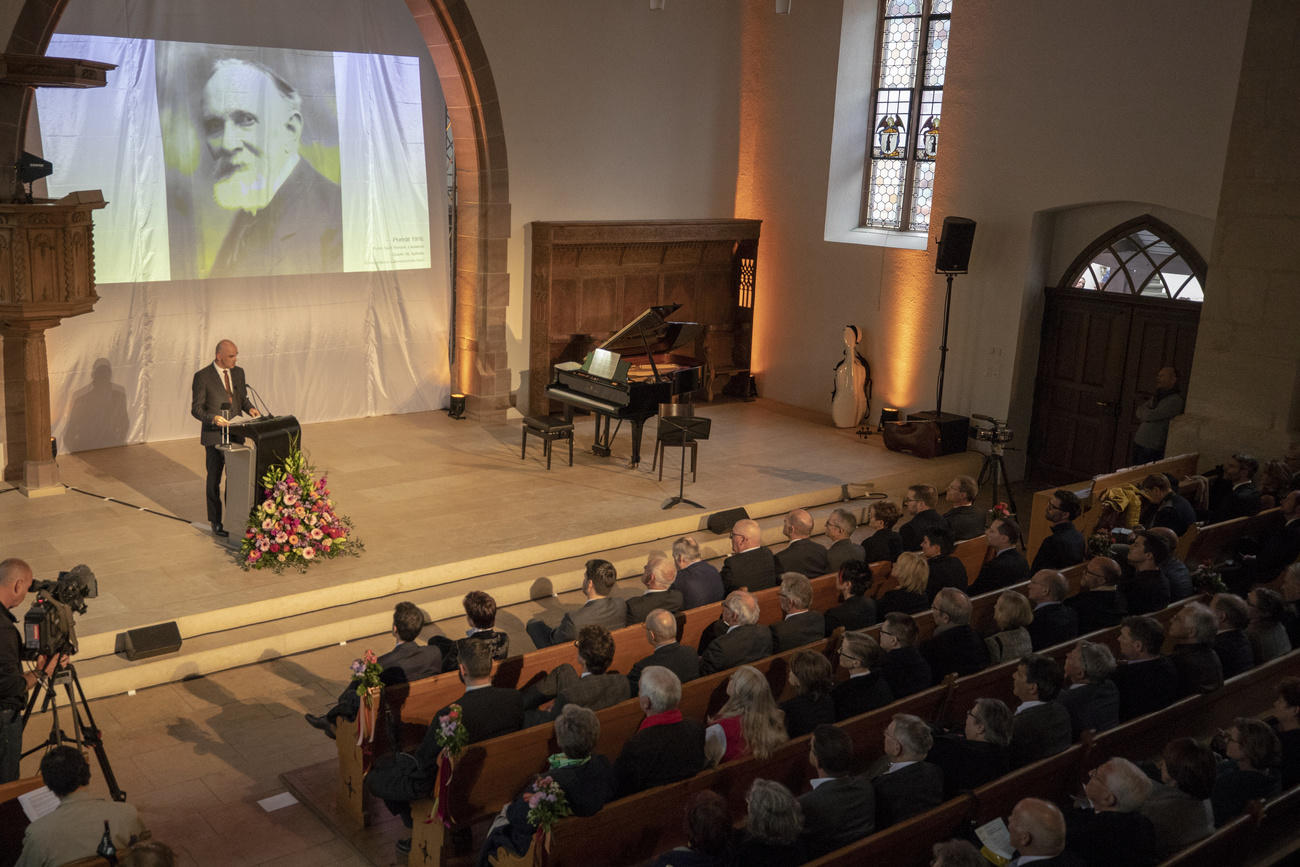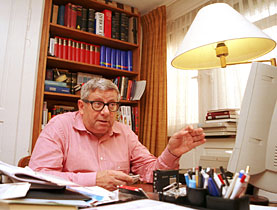When a Swiss won a Nobel Prize for literature

The Nobel Prize committee on Thursday awarded this year’s honour to Austrian writer Peter Handke. Exactly 100 years ago, it was Swiss poet Carl Spitteler who won the prestigious literature award.
The life of Carl Spitteler (1845-1924) was far from ordinary. After studying theology, he left Switzerland for St Petersburg to work as a private tutor. Ten years later and back from Russia, he taught German, ancient Greek and Latin and also worked as a journalist.
In 1892 he gained financial independence after marrying a daughter from a well-off family. This allowed him to devote his career to literature. He made a name for himself in the German-speaking cultural world notably with allegoric and epic poems inspired by Greek mythology.
Among his enthusiastic readers was Sigmund Freud, who named his first psychoanalytical study Imago after a book by Spitteler.
Appeal for neutrality
It is a paradox that Spitteler’s fame is not primarily based on his literary output but on a speech.
At the beginning of the First World War in 1914, he made a public address commissioned by the New Helvetian Society, an influential organisation of intellectuals, politicians and army leaders. Entitled Unser Schweizer Standpunkt (our Swiss position), it called on multilingual Switzerland to unite in the face of serious tensions between neighbouring Germany and France.
His appeal for peace attracted public attention and his condemnation of the destruction of the cathedral of Reims in France by German troops won him the sympathies of the allied forces and the neutral states.
His speech was no doubt an important factor in making him the only Swiss-born Nobel laureate for literature. Hermann Hesse, a German-born writer who took Swiss citizenship, was awarded the prize in 1946.
Spitteler’s speech was an appeal for neutrality and was clearly aimed at reconciling Switzerland’s German- and French-speaking communities. Relations between them were strained amid an open conflict in neighbouring countries.
Swiss values
Despite criticism at the time, the speech came to serve as a perfect justification for two highly praised Swiss values: federalism and neutrality.
It is debatable whether Spitteler’s speech actually set the cornerstones for Switzerland’s foreign policy of active neutrality.
Literary expert Stefanie Leuenberger says the speech did play a significant role at a time when the country was split into linguistic groups to a degree that is hard to conceive today. But she argues that the importance of the address was played up too much in the 1930s as part of the official political-cultural national defence movement to defend the country against totalitarian regimesExternal link.
“Carl Spitteler’s image was typecast by setting up statues of him and by naming streets after him,” Leuenberger says. “He was made a classic conservative author, although he was the opposite of this.”
Time to be rediscovered
Over the years his political positions – and his writing even more so – have gradually fallen into oblivion. But on the centenary of his Novel Prize, a committee has launched a campaignExternal link with public lectures and other events across the country.
Leuenberger, who is a member of the committee, says it is time to rediscover Spitteler.
“Readers will notice that Spitteler was not just a conservative author but also a fierce critic of society. He denounced racist and xenophobic tendencies at the time, but these problems remain relevant today.”
But it didn’t take the anniversary events for Spitteler to step back into the spotlight. It happened in 2017 when the Chinese president was on a state visit to Switzerland. Xi Jinping quoted Spitteler in a speech when he said the greatest pleasure is “to find friends with whom one shares breath like one shares destiny”.

More
What’s behind Switzerland’s star-studded Nobel success?
Adapted from French/urs

In compliance with the JTI standards
More: SWI swissinfo.ch certified by the Journalism Trust Initiative












You can find an overview of ongoing debates with our journalists here . Please join us!
If you want to start a conversation about a topic raised in this article or want to report factual errors, email us at english@swissinfo.ch.